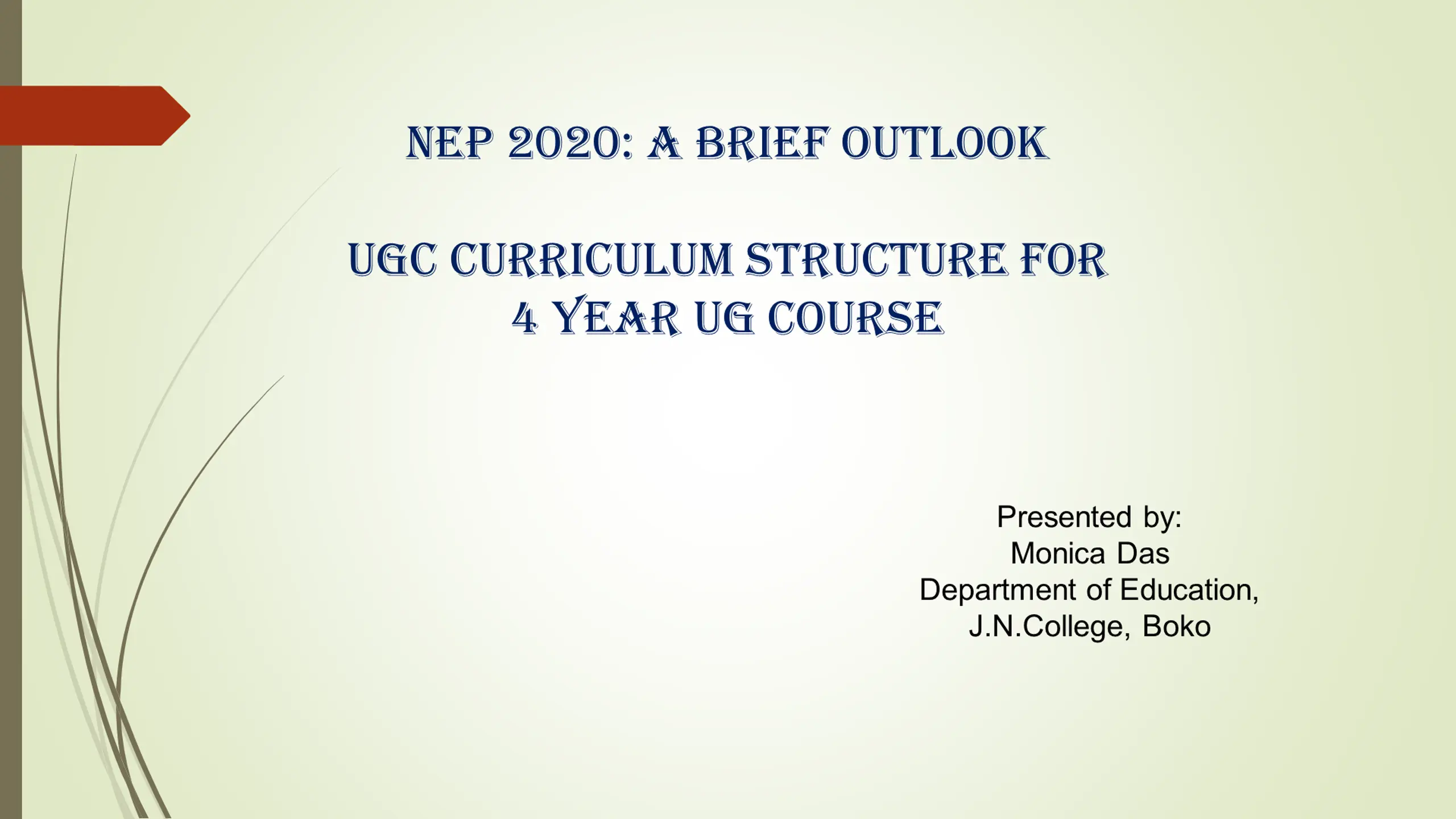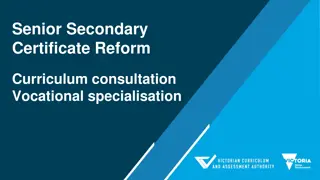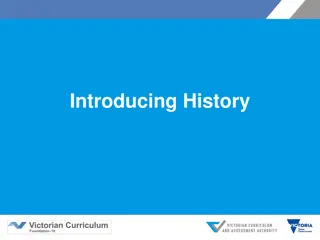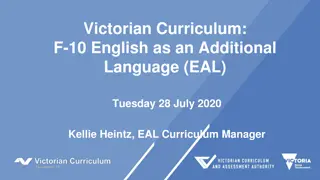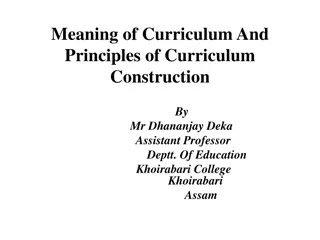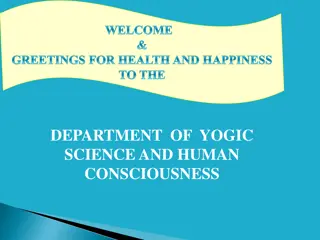UGC curriculum structure for 4 year UG course
Overview of the UGC curriculum structure for a 4-year undergraduate course in light of the National Education Policy 2020. It highlights the fundamental principles, changes in CBCS, main features of the new curriculum framework, and the duration of the program.
Download Presentation

Please find below an Image/Link to download the presentation.
The content on the website is provided AS IS for your information and personal use only. It may not be sold, licensed, or shared on other websites without obtaining consent from the author.If you encounter any issues during the download, it is possible that the publisher has removed the file from their server.
You are allowed to download the files provided on this website for personal or commercial use, subject to the condition that they are used lawfully. All files are the property of their respective owners.
The content on the website is provided AS IS for your information and personal use only. It may not be sold, licensed, or shared on other websites without obtaining consent from the author.
E N D
Presentation Transcript
NEP 2020: A brief outlook UGC curriculum structure for 4 year UG course Presented by: Monica Das Department of Education, J.N.College, Boko
Elaborated Vision of NEP 2020 This National Education Policy aims at building a global best education rooted in Indian ethos and aligned with the principles of flexibility, multidisciplinary, understanding, critical and creative thinking, ethics, human and constitutional values, capacity building in teachers, good governance and autonomy, respect for diversity, equity and inclusivity and outstanding research- transforming India into a global knowledge superpower.
Fundamental Principles Enshrined in The NEP 2020 Recognizing, identifying, and fostering the unique capabilities of each student and promote each student s development in both academic and non-academic spheres. Multidisciplinary and skill based education with emphasis on conceptual understanding creativity and critical thinking , ethics and human & Constitutional values. Extensive use of technology : to reach the unreached and adopting multiple platforms for teaching and learning Respect for diversity and local context : by bringing in language, local art and craft as compulsory elements of learning.
Changes in CBCS as envisaged in NEP 2020 More flexibility and innovativeness has been infused in NEP. Introduction of multidisciplinary development of students. No rigid boundary between streams, curricular and extra curricular, vocational and academic. Emphasis on ethics, human and constitutional values through curriculum. Life skill education and ICT in education to be a part of all curriculum. and holistic
Main features of new UG curriculum framework Flexibility to move from one discipline of study to another. Opportunity for students to choose courses of their interest among all disciplines. Facilitating multiple entry and exit options. Flexibility for students to move from one to another institute in order to enable them for multi/ interdisciplinary learning. Flexibility to switch to alternative modes of learning (offline/online/ODL/hybrid mode).
Duration of the New UG Programme A total of 4years or 8 semesters. Students can also do a 3year UG programme exiting after the completion of the 3rd year (subject to a minimum credit). If a student leave after completing the 1st year, then they will be given a UG certificate and if they leave after 2years, then they will be provided with a UG diploma. Student who exit with UG certificate or diploma are permitted to re-enter within 3years and programmes. The students are provided with breaks if they want, but the entire term for completing the UG programme should not exceed 7years in totality. can complete the degree
Structure of 4year UG programme An academic year shall consist of 2 semesters (each of 90 working days). A special summer term for 8weeks or 2months and the courses shall aid to enable the students to complete arrears/ special courses. The summer term courses will be designed as per requirement and availability of the teaching faculty and resources as per guidance of the respective HEIs. Internship/apprenticeship shall be carried out during the summer term courses, which will be mandatory for all students including the students who aim for an exit after 2/4 semesters of study.
Structure of Major and Minor Disciplines Major disciplines: The main or major subject will be the one in which the degree will be awarded. Students should secure prescribed number of credits (min. 50 % of the total) through core courses in the major discipline. Minor disciplines: These are introduced to allow a student to gain a broader understanding beyond the major discipline. For obtaining a minor discipline minimum 12 credits are required. For example, a student pursuing a chemistry major obtaining a minimum credit of 12 from physics will get a BSc degree in Chemistry with a minor in Physics.
Change of Major At the end of 2nd semester, a student can decide either to continue with the previously chosen major or can request for a change in major. HEIs may create an additional 10% seats over and above the sanctioned strength for this purpose. There must be a basket of possible minors along with a particular major.
Multiple entry and exit scheme (MEES) UG CERTIFICATE UG Certificate will be provided after the completion of 1st year. A student need to complete at least 40 credits and 1 vocational course (4credit) during summer vacation of 1st year. UG DIPLOMA UG Diploma will be provided after completion of 2nd year. A student need to complete at least 80 credits and 1 vocational course (4credit) during summer vacation of 2nd year. **A student is allowed to re-enter within 3years of their respective certificate/diploma courses and must complete the whole UG Programme within the maximum limit of 7years.
3years Degree in Major Discipline Requirements: 1. Complete 3years with a minimum of 120 credits. 2. Complete minimum credit requirement as follows Major---------------------------------------------------60 Minor---------------------------------------------------24 Multidisciplinary ------------------------------------09 AEC (Ability Enhancement Course)---------08 SEC (Skill Enhancement Course)--------------09 VAC (Value Added Course)--------------------06 to 08 Summer Internship----------------------------------02 to 04
4years UG Degree (Honours with Research) Criteria: A min. of 75% marks and above as aggregate must be secured after the completion of 6semesters to take honours with research. A total of min. 160 credit is required to complete the prescribed degree. The total credit distribution is as shown below: Major----------------------------------------------------------------------------80 Minor----------------------------------------------------------------------------32 Multidisciplinary -------------------------------------------------------------09 AEC (Ability Enhancement Course)----------------------------------08 SEC (Skill Enhancement Course)--------------------------------------09 VAC (Value Added Course)-------------------------------------------06 to 08 Summer Internship---------------------------------------------------------02 to 04 Research project/ dissertation(major discipline)----------------12
UG Programme with Single major: Needs to secure a minimum of 50% credits from major discipline. For 3year UG programme: 60 credits (in the major discipline) if total credits programme is 120. For 4year UG programme: 80 credits (in the major discipline) if total credits to be earned for programme is 160. to be earned for the the
UG Programme with Double major: Needs to secure a minimum of 40% credits from the second major discipline. For 3year UG programme: 48 credits (in the second discipline) if total credits to be earned for the programme is 120. For 4year UG programme: 64 credits (in the second discipline) if total credits to be earned for the programme is 160. Remark : Students will have to do additional credits for UG programme with double major.
Interdisciplinary UG Programmes Interdisciplinarity analyses, synthetizes and harmonizes link between disciplines into a coordinated and coherent whole. Credit of core courses shall be distributed among the constituent disciplines. Core courses: (distributed across) Economics, Statistics and Mathematics, etc. BSc in Econometrics (3years) or BSc (Honours) in Econometrics (4years) or BSc (Honours with Research) in Econometrics (4years).
Vocational education and training Vocational Education and Training to be an integral part of the UG Programme to impart skills along with theory and practical. These courses will be helpful to find a job for those students who exit before completing the programme. Courses can be taken up on: Software skills / Digital marketing / Digital media creation / Language expertise / Laboratory safety techniques / Web management
Internship (2 to 4 credits) Students internships with local industry, firms, businesses, artists, craft persons, etc. Research internships may also be provided with faculty and researchers at their own or other HEIs. Students maybe provided with opportunities for internships in health and allied areas, local governments, media organizations. It should be ensured that students may actively engage with practical side of their learning and as a by product for further improvement of their employability. should be provided with opportunities for
Courses from other disciplines (Multidisciplinary) (9credits) All UG students shall undergo 3 introductory level courses relating to any of the broad disciplines: A. Natural and Physical Sciences B. Mathematics, Statistics and Computer Applications C. Library, Information and Media Sciences D. Commerce and Management E. Humanities and Social Sciences. Students are not allowed to repeat or choose courses already undergone at the higher secondary level (12thclass) in the proposed major and minor stream under this category. These courses are intended to broaden the intellectual experience and form part of liberal and science education.
Ability Enhancement Courses (AEC) A total of 8 credits. Modern Indian Language (MIL) : 4 credits English Language : 4 credits
Skill Enhancement Course Aimed at imparting practical skills, hands on training, soft skills, etc in order to enhance the employability of the students. Courses that maybe offered (suggestive): Business communication, creative cultural heritage management, graphics and animation, waste management, etc. Remark: UGC model courses Development: 4 courses have been designed with 2credits each. 1. Communication skill 2. Professional skill 3. Leadership and Management skill 4. Universal Human Values. writing, computer skills, (Jeevan Kaushal) on Skill
Value added courses (VAC) VAC are common to all UG students. (6 to 8 credits) Understanding India. Environmental Science. Digital and Technological Solutions. Health and Wellness, Yoga Education, Sports and Fitness.
